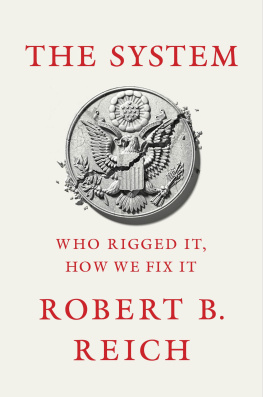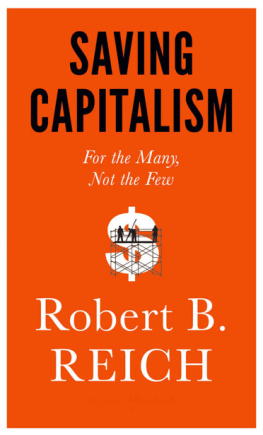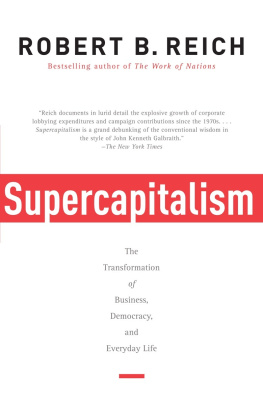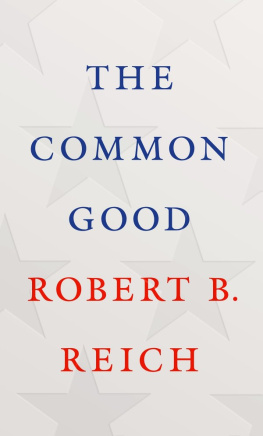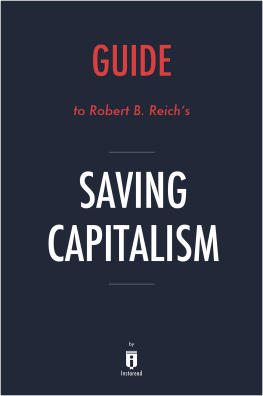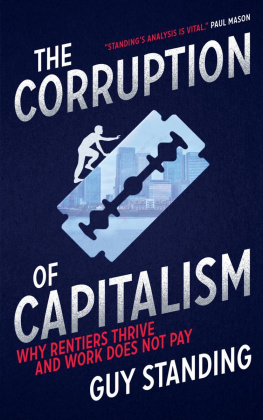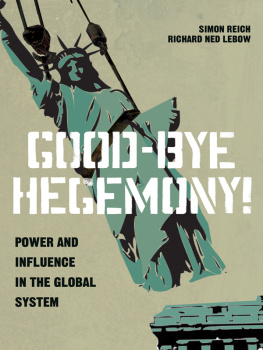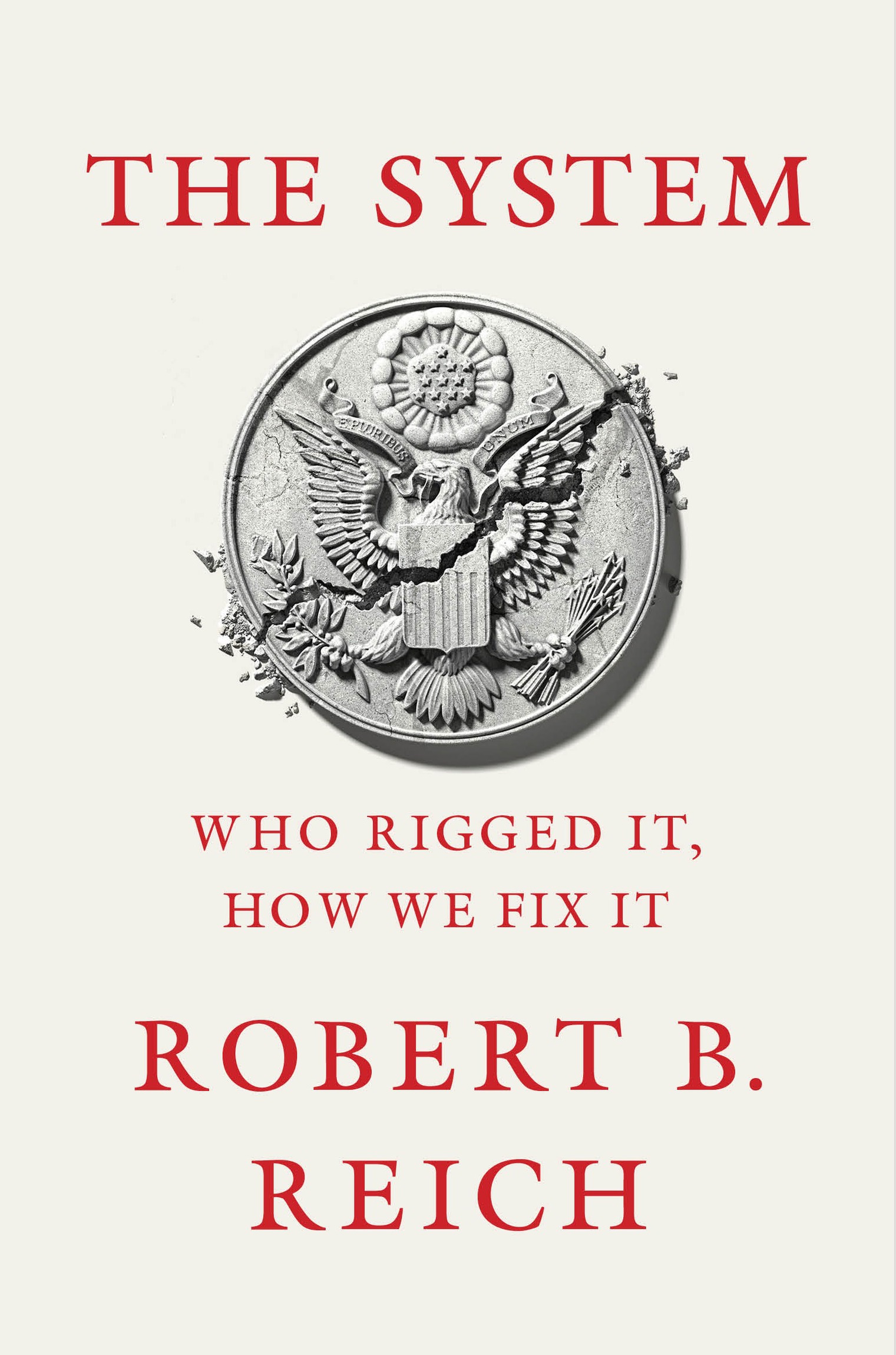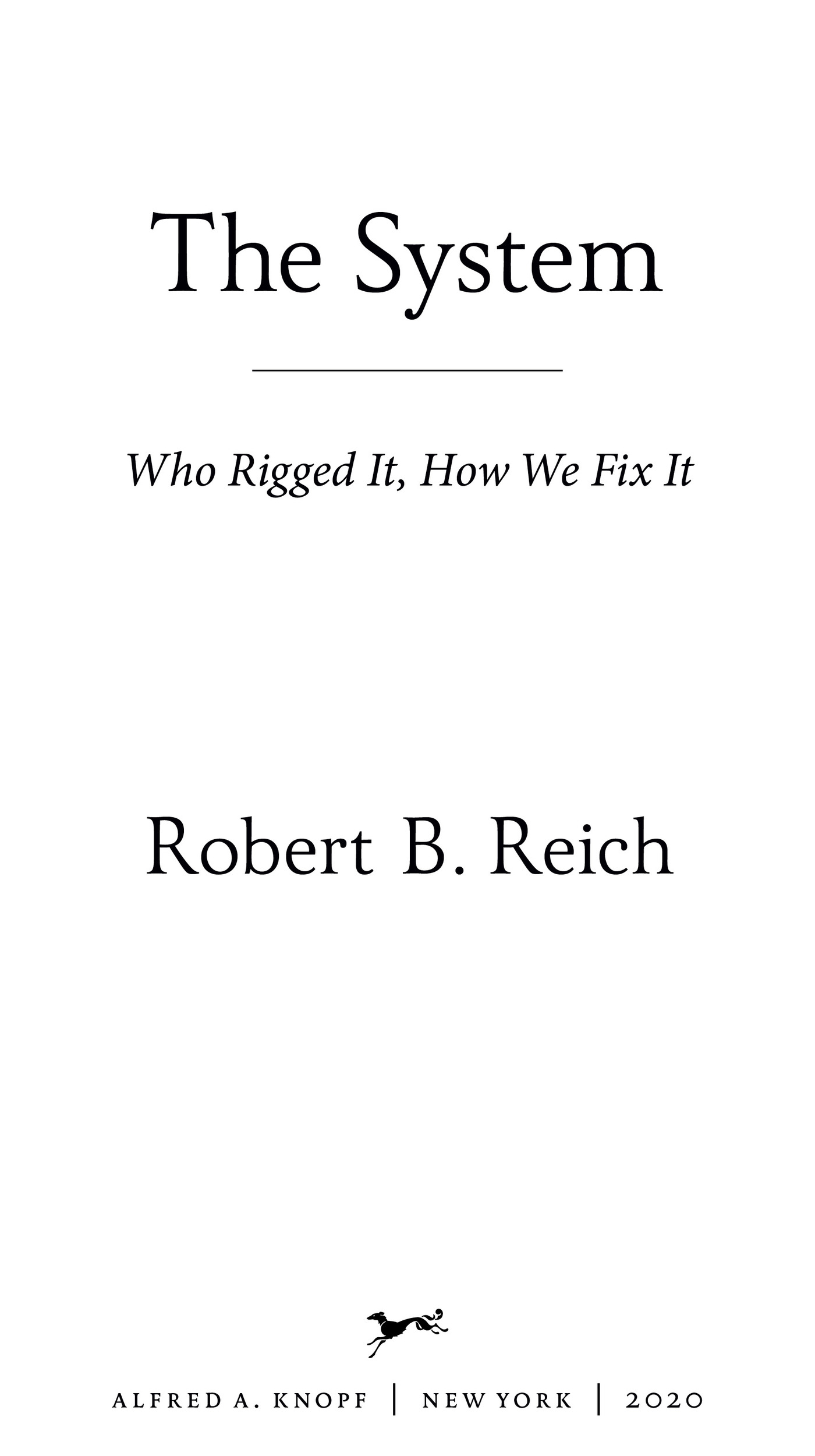ALSO BY ROBERT B. REICH
The Common Good
Economics in Wonderland
Saving Capitalism
Beyond Outrage
Aftershock
Supercapitalism
Reason
Ill Be Short
The Future of Success
Locked in the Cabinet
The Work of Nations
The Resurgent Liberal
Tales of a New America
New Deals (coauthor with John D. Donahue)
The Next American Frontier
Minding Americas Business (coauthor with Ira Magaziner)
AS EDITOR
The Power of Public Ideas
DOCUMENTARIES
(co-created with Jacob Kornbluth)
Inequality for All
Saving Capitalism
THIS IS A BORZOI BOOK
PUBLISHED BY ALFRED A. KNOPF
Copyright 2020 by Robert B. Reich
All rights reserved. Published in the United States by Alfred A. Knopf, a division of Penguin Random House LLC, New York, and distributed in Canada by Penguin Random House Canada Limited, Toronto.
www.aaknopf.com
Knopf, Borzoi Books, and the colophon are registered trademarks of Penguin Random House LLC.
Library of Congress Cataloging-in-Publication Data
Names: Reich, Robert B., author.
Title: The system : who rigged it, how we fix it / Robert B. Reich.
Description: First edition. | New York : Alfred A. Knopf, 2020.
Identifiers: LCCN 2019044129 (print) | LCCN 2019044130 (ebook) | ISBN 9780525659044 (hardcover) | EBOOK ISBN 9780525659051
Subjects: LCSH : Dimon, Jamie. | DemocracyUnited States. | OligarchyUnited States. | Corporate powerUnited States. | Business and politicsUnited States. | Elite (Social sciences)United States. | United StatesPolitics and government1989.
Classification: LCC JK 275 . R 455 2020 (print) | LCC JK 275 (ebook) | DDC 322/.30973dc23
LC record available at https://lccn.loc.gov/2019044129
LC ebook record available at https://lccn.loc.gov/2019044130
Cover art by Justin Metz
Cover design by Tyler Comrie
v5.4
ep
For future generations
Contents
Introduction
IN THE SPRING OF 2018, Jamie Dimon phoned me at my office at the University of California, Berkeley. I had criticized him publicly, and he was not pleased. He sounded off on the phone for several minutes without stopping. Finally he asked, You still there? I said Yes and then told him in abbreviated form what I will tell you in the rest of this book.
Dimon has a great amount of influence over the system. He heads the largest bank on Wall Street, JPMorgan Chase, which survived the 2008 financial crisis better than any other big bank. After the crisis, The New York Times gave Dimon the backhanded compliment of naming him Americas least-hated banker. He also heads the Business Roundtable, a lobbying group comprised of the most powerful CEOs in America. He is featured regularly on cable news and in the business press. His opinions carry significant weight on Capitol Hill.
Dimon says hes a patriot before Im the CEO of JPMorgan. He is a lifelong Democrat. He speaks out about the injustices and inequalities of contemporary America. He is not just talk. He has pushed his bank to invest in poor cities and to create better opportunities for the disadvantaged.
I believe hes sincere. But he is awash in self-delusion, a condition especially dangerous in people who have significant power over others. Dimon doesnt see how he has contributed to the mess were in. He doesnt acknowledge the inconsistencies between his preferred self-image as patriot first and his roles as CEO of Americas largest bank and chair of the Business Roundtable. He doesnt understand how he has hijacked the system.
I often single out Dimon in this book because he is emblematic of an abdication of public responsibility to maintain the health of our political-economic system at a time when a comparative few at the top have more power over it than at any other time in more than a century. They have used their power to give themselves unprecedented wealth, which has bought them even more power. They have justified their wealth and power as being in the interest of the public, but the public has been shafted.
Dimon himself is not the problem. If he werent running JPMorgan or chairing the Business Roundtable, someone else would be, and probably not as capably. Regardless of who is in charge, a big part of those jobs is siphoning off the gains of the economy for the benefit of a few at the top. This is how the current system is organized. This is how incentives within the system are designed.
To the extent Dimon or others like him are blameworthy, the fault lies in their unwillingness to buck these incentives in order to change the system for the well-being of the vast majority. This may be an unrealistically high bar. Dimon has no legal obligation to reach it. But does he have a moral duty to try to change the laws and incentives so no one ever again can become as rich and powerful as he and his colleagues at the Business Roundtable? Does he have a moral obligation to ensure that the American system is no longer rigged in favor of people like him? I believe he does. Let me explain.
Millions of Americans, whether on the left or the right of the political spectrum, know something has gone profoundly wrong. Right now, we have a system that favors those who can pay for access and outcomes. Thats how you explain an economy that is rigged to corporations and to the very wealthiest, said Beto ORourke at the first Democratic presidential candidates debate in 2019.
When youve got a government, when youve got an economy that does great for those with money and isnt doing great for everyone else, that is corruption, pure and simple, said Senator Elizabeth Warren at the same forum.
Big business, elite media, and major donors are lining up behind the campaign of my opponent because they know she will keep our rigged system in place, said Donald Trump in his acceptance speech at the Republican convention in 2016.
If solutions within the system are so impossible to find, then maybe we should change the system itself, said sixteen-year-old climate activist Greta Thunberg.
As New York magazines Frank Rich put it: Everything in the country is broken. Not just Washington, which failed to prevent the financial catastrophe and has done little to protect us from the next, but also race relations, health care, education, institutional religion, law enforcement, the physical infrastructure, the news media, the bedrock virtues of civility and community. Nearly everything has turned to crap, it seems, except Peak TV (for those who can afford it). He might have added the environment and our democracy.
The concentration of wealth in America has created an education system in which the super-rich can buy admission to college for their children, a political system in which they can buy Congress and the presidency, a health-care system in which they can buy care that others cant, and a justice system in which they can buy their way out of jail. Almost everyone else has been hurled into a dystopia of bureaucratic arbitrariness, corporate indifference, and legal and financial sinkholes that have become the hallmarks of modern American life.

